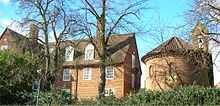The Queen's Foundation

The Queen's Foundation, for Ecumenical Theological Education (called the Queen's Foundation, Birmingham; grid reference SP047843), Somerset Road, Edgbaston, Birmingham, is an ecumenical theological college which, with the West Midlands Ministerial Training Course, forms the Centre for Ministerial Formation of the Queen's Foundation for Ecumenical Theological Education. It serves the Church of England, the Methodist Church and the United Reformed Church, and its courses thus have a strong ecumenical emphasis.[1]
The Queen's Foundation itself consists of the Centre for Ministerial Formation, the Queen's Graduate and Research Centre, the Centre for Black Ministries and Leadership, and the Selly Oak Centre for Mission Studies (the successor to the Selly Oak Colleges).
The Queen's Foundation was associated with the University of Birmingham to which it is very near and for whose certificates, diplomas and degrees students read. However in 2009/10 the University of Birmingham completed its review of the School of Philosophy, Theology and Religion, including its collaborative arrangements. The review recommended terminating the arrangements with Queen’s for both taught and research degrees. A new validation agreement was made with Newman University) for taught degree programmes. Also in 2011 a new validation agreement was made with the University of Gloucestershire for research degrees.[2] The Queen's Graduate and Research Centre offers post-graduate study for the Master of Arts in applied theological study, and research facilities for the degrees of Master of Philosophy, Doctor of Theology and Doctor of Philosophy. The residential block and lodge (1929–30), and chapel (1938–47) are by local architect Holland W. Hobbiss. The chapel was the first English ecclesiastical building with an altar built for the celebrant to face the congregation.[3] The college hosts the UKMT Mathematics Summer School each summer for approximately 40 students.
Origins

The college started as Queens' College in Paradise Street,[4] central Birmingham in 1828, as an Anglican-based medical school which developed a broad range of education. Eventually the non-theological departments joined the nearby Mason Science College which became the University of Birmingham in 1900, leaving Queen's College as a theological establishment, which moved to Somerset Road in 1923. The Selly Oak Centre for Mission Studies was formed in 2006 as the successor to the United College of the Ascension, one the former Selly Oak Colleges, and remains sponsored by the United Society for the Propagation of the Gospel and the Methodist Church.
List of principals since 1923
- The principal of the theological foundation has usually been an ordained Anglican priest.
- 1923–1934 (res.): Herbert Raison
- 1934–1954 (res.): John Cobham
- 1954–1967 (res.): Arthur Gribble
- 1967–1973 (res.): John Habgood
- 1974–1979 (res.): Anthony Bird
- 1979–1987 (res.): Gordon Wakefield (Methodist minister)
- 1987–1993 (res.): Jamie Walker (Church of Scotland (presbyterian) minister)
- 1994–2002 (res.): Peter Fisher
- 2003–present: David Hewlett
References
- ↑ Queen's College Programmes of Study http://www.queens.ac.uk/programmes
- ↑ https://search.churchofengland.org/results.aspx?k=queens%20college%20birmingham
- ↑ Pevsner Architectural Guides - Birmingham, Andy Foster, 2005, ISBN 0-300-10731-5, p252
- ↑ The Making of Birmingham: Being a History of the Rise and Growth of the Midland Metropolis, Robert K. Dent, Published by J. L. Allday, 1894